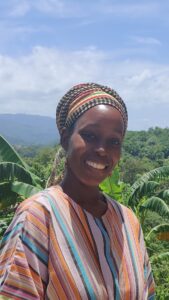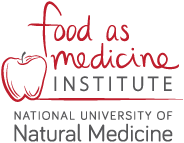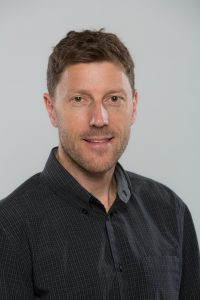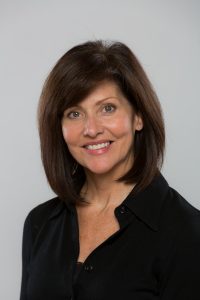An Ayurvedic Approach in the Treatment of Diabetes Type 2 | Olatokunboh Obasi MSc, RH, CNS
Diabetes Type 2 is a one of the most prevalent disease states that many suffer from throughout the world and especially on the island of Puerto Rico. Diet and exercise are most advised in consultation with 80% success in treatment outcomes through diet shifts in diabetic populations. This presentation will focus on clinical herbal perspective as to how various foods and herbal medicines common in Ayurveda shift healthy outcomes in diabetic populations. We will discuss various treatment protocols involving foods as medicines to address the various imbalances in constitutions in which Ayurveda accurately approaches clinically.
Olatokunboh Obasi MSc, RH, CNS, is the owner of Omaroti, an apothecary and wellness space located in Mayagüez, Puerto Rico. Olatokunboh Obasi has been working in the wellness field for over 15 years. She is a yoga and dance instructor, clinical herbalist, nutritionist and birth doula. Committed to community holistic health, social justice, and education, she works heavily in community service and African Traditional Medicine. Presently, she coordinates Herbalists without Borders International on the island providing devotional service to people in need with her free clinics every Thursday. A guest presenter and teacher of many conferences she’s originally from Africa, her travels around the world are extensive as she integrates traditional knowledge of herbs, with her western education. She received her Master’s of Science from Maryland University of Integrative Health. Olatokunboh is a mother of 3 young adults. She continues to learn from her children through challenge and tribulation as she shares her journey of life with them and the human family.

Food, Inflammation, and the Microbiome | Heather Zwickey, PhD
The immune system is designed to produce an inflammatory response to an infectious disease. However, we consistently find people “stuck” in inflammation after an infection (such as those with Post-COVID Syndrome) or without an infection at all. In this lecture, we will explore what happens with people who have chronic inflammation. We will also discuss how food and the microbiome can contribute to their inflammation or help them heal.
Dr. Zwickey earned a Ph.D. in Immunology and Microbiology from the University of Colorado Health Sciences Center with a focus on infectious disease and vaccine development. Dr. Zwickey went on to complete a postdoctoral fellowship and teach medical school at Yale University where she worked on immunotherapy for cancer.
She was then recruited to the National University of Natural Medicine in Portland, OR, where she launched the Helfgott Research Institute and established the School of Graduate Studies, developing programs in integrative medicine research, nutrition, and global health among others. She currently leads an NIH funded clinical research tr aining program focused on training the next generation of integrative medicine researchers. She teaches at many universities and speaks at conferences world-wide. At Helfgott Research Institute, Dr. Zwickey applies her immunology expertise to natural medicine, with specific interest in the gut-brain axis in neuroinflammation.
aining program focused on training the next generation of integrative medicine researchers. She teaches at many universities and speaks at conferences world-wide. At Helfgott Research Institute, Dr. Zwickey applies her immunology expertise to natural medicine, with specific interest in the gut-brain axis in neuroinflammation.
The Art and Science of Mental Health Nutrition | Leslie Korn, PhD, MPH, LMHC
In this first of two talks, Dr. Korn provides an in-depth overview of a non-ideological approach to the art and science of integrative and functional nutrition for mental health. We will explore the use of bioidindividual diets, ranging from carnivore to vegetarian in mental health including the use of specific foods and botanicals along with nutritional supplements such as vitamins, minerals, special nutrients, and glandulars to treat depression, anxiety, PTSD and insomnia. We will explore foundational nutrients, protocol design and issues of program adherence and personality. Finally, we will touch upon helping people decrease or eliminate psychotropic use by using an integrative approach.
Leslie Korn, PhD, MPH, LMHC, FNTP, began her training in the jungle of Mexico over 40 years ago and completed her degrees in the jungle of Harvard Medical School. She is an Integrative Medicine clinician, scientist, educator and author who specializes in the intersection of trauma, and chronic physical illness. She is a former faculty member at Harvard Medical School, California Institute for Integral Studies and NUNM. She directs research at cwis.org, a Native-directed non- profit 501 c 3. She has authored 10 books, including two seminal texts, Rhythms of Recovery: Trauma, Nature and the Body and Nutrition Essentials for Mental Health. Her most recent book: Natural Woman, details her methods of herbal and culinary medicine based on adventures in the jungle for over 25 years https://institute.drlesliekorn.com/ and https://drlesliekorn.com/
Diet & Dermatology: The Role of Diet in Skin Disease | Julie Greenberg, ND
Successfully treating chronic skin diseases poses a challenge to health care professionals, as conventional treatment options often do not provide satisfactory results. A comprehensive treatment plan should ideally include dietary recommendations for patients, but providing clear information on what to eat (or what not to eat) can be challenging for health care professionals. Come learn about the latest research connecting diet to skin disease and learn specifics on how to create a food action plan to help treat your patients with acne, eczema, psoriasis, rosacea, hidradenitis suppurativa, vitiligo, and alopecia.
 Dr. Julie Greenberg is a licensed Naturopathic Doctor who specializes in integrative dermatology. She is the founder of the Center for Integrative Dermatology (www.integrativedermatologycenter.com), a holistic dermatology clinic that approaches skin problems by finding and treating the root cause. Dr. Greenberg hold degrees from Northwestern University, Stanford University and Bastyr University, and she lectures at medical schools and speaks at conferences across the U.S. on dermatology.
Dr. Julie Greenberg is a licensed Naturopathic Doctor who specializes in integrative dermatology. She is the founder of the Center for Integrative Dermatology (www.integrativedermatologycenter.com), a holistic dermatology clinic that approaches skin problems by finding and treating the root cause. Dr. Greenberg hold degrees from Northwestern University, Stanford University and Bastyr University, and she lectures at medical schools and speaks at conferences across the U.S. on dermatology.
Nutrition for Diabetes Type 2, Cognitive Health and Alzheimer’s Disease | Leslie Korn, PhD, MPH, LMHC
This second of two talks by Dr. Korn provides an overview of state -of -the- art science about foods, nutrients and herbal medicine for the prevention and treatment of Diabetes Type 2, Cognitive Health and Alzheimer’s Disease. We will explore bio-individuality, genetics, alternatives to medications such as statins and Metformin, the intersection of culture, and why there is no one right diet for everyone.
 Leslie Korn, PhD, MPH, LMHC, FNTP, began her training in the jungle of Mexico over 40 years ago and completed her degrees in the jungle of Harvard Medical School. She is an Integrative Medicine clinician, scientist, educator and author who specializes in the intersection of trauma, and chronic physical illness. She is a former faculty member at Harvard Medical School, California Institute for Integral Studies and NUNM. She directs research at cwis.org, a Native-directed non- profit 501 c 3. She has authored 10 books, including two seminal texts, Rhythms of Recovery: Trauma, Nature and the Body and Nutrition Essentials for Mental Health. Her most recent book: Natural Woman, details her methods of herbal and culinary medicine based on adventures in the jungle for over 25 years https://institute.drlesliekorn.com/ and https://drlesliekorn.com/
Leslie Korn, PhD, MPH, LMHC, FNTP, began her training in the jungle of Mexico over 40 years ago and completed her degrees in the jungle of Harvard Medical School. She is an Integrative Medicine clinician, scientist, educator and author who specializes in the intersection of trauma, and chronic physical illness. She is a former faculty member at Harvard Medical School, California Institute for Integral Studies and NUNM. She directs research at cwis.org, a Native-directed non- profit 501 c 3. She has authored 10 books, including two seminal texts, Rhythms of Recovery: Trauma, Nature and the Body and Nutrition Essentials for Mental Health. Her most recent book: Natural Woman, details her methods of herbal and culinary medicine based on adventures in the jungle for over 25 years https://institute.drlesliekorn.com/ and https://drlesliekorn.com/
The Low Sulfur Dietary Protocol: Rational, Implementation, and 8 Years of Observations | Greg Nigh, ND, LAc & Maria Zilka, NTP
In this presentation, Dr. Nigh presents an overview of the metabolic fate of dietary sulfur, explaining how improper sulfur metabolism can lead to a wide range of acute and chronic conditions that very commonly resolve with implementation of the diet. This talk will explore case studies that illustrate dramatic symptom resolution for patients finding no health with other diets or therapies. Finally, Maria gives an overview of the implementation of the diet, with tips and tricks she has learned over the years working with patients.
Dr. Nigh is a 2001 graduate of NUNM. He has a clinical focus on naturopathic oncology, but also treats a wide range of chronic conditions including mold illness, Lyme disease, SIBO, autoimmune disorders, and much else. Maria Zilka, NTP, is a 2008 graduate of the Nutrition Therapy Practitioner program and has worked collaboratively with Dr. Nigh since that time. Maria developed the low sulfur dietary program that has been successfully implemented with several hundred patients around the world.
The Complexity of Food Intolerance: Looking at various types of food intolerances as a symptom of a larger immune dysregulation | Heidi Turner, MS, RDN, CD
We can use food elimination to reduce the severity of the symptoms one experiences but elimination rarely addresses the root cause of the issue. In this discussion, we will look at how a number of physiological imbalances can lead to various food intolerance with a special focus on histamine, sulfur, salicylates and FODMAPs. We will discuss how to assess for these types of food intolerances, when to apply elimination strategies, and how they can either help, or hinder outcome.
Heidi Turner, MS, RDN, CD is an Integrative Registered Dietitian Nutritionist at her telehealth-based private practice, FoodLogic (foodlogic.org) located in Tacoma, WA. She specializes in complex health issues including SIBO,  autoimmune conditions, histamine intolerance, Mast Cell Activation Syndrome and food chemical sensitivities. She spent 12 years at The Seattle Arthritis Clinic at Northwest Hospital-University of Washington where she counseled thousands of rheumatology patients on ways to reduce inflammation through dietary change and manipulation of the microbiome. She is the co-creator of the “Low Histamine Biphasic Diet” with Dr. Nirala Jacobi. Heidi earned her Master’s degree from Bastyr University in Kenmore, Washington. She lives happily in the Puget Sound area of Washington State with her husband, son and devoted cats.
autoimmune conditions, histamine intolerance, Mast Cell Activation Syndrome and food chemical sensitivities. She spent 12 years at The Seattle Arthritis Clinic at Northwest Hospital-University of Washington where she counseled thousands of rheumatology patients on ways to reduce inflammation through dietary change and manipulation of the microbiome. She is the co-creator of the “Low Histamine Biphasic Diet” with Dr. Nirala Jacobi. Heidi earned her Master’s degree from Bastyr University in Kenmore, Washington. She lives happily in the Puget Sound area of Washington State with her husband, son and devoted cats.
Thriving with Autoimmunity: How to Help Your Clients Find Relief Naturally from Autoimmune Symptoms Using the Autoimmune Protocol (AIP) | Shanna Nemrow, FNTP
The autoimmune protocol (AIP) is a nutrition and lifestyle protocol specifically designed to help those with autoimmune disease find relief from their autoimmune symptoms and learn to live well with autoimmune disease. While the AIP has the potential to be life changing, it can feel all kinds of overwhelming to clients.
Shanna Nemrow, FNTP, will present the ins and outs of the autoimmune protocol, as well as how to simplify the AIP for clients, approaches to starting the AIP to offer your clients, troubleshooting the AIP with your clients when they are not seeing results, why the AIP is not a one size fits all approach, and more.
Shanna Nemrow, FNTP, became a certified Functional Nutritional Therapy Practitioner after years of undiagnosed health struggles, an autoimmune disease diagnosis, and regaining her health through overhauling her nutrition, lifestyle, and mindset with the autoimmune protocol (AIP) as a guide. After learning first hand the power of food and lifestyle as medicine, Shanna now makes it her mission to help others learn to find joy while living well with autoimmune disease. She offers loving support and community for others battling autoimmune disease and chronic illness.
Shanna is an expert at the AIP, and in addition to working with clients one on one in her online practice, she also created a life changing online AIP group coaching program. Shanna lives with her husband and two children in the beautiful mountains of Park City, Utah. You can learn more about Shanna at https://shannanemrow.com.





